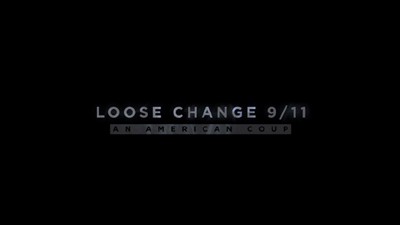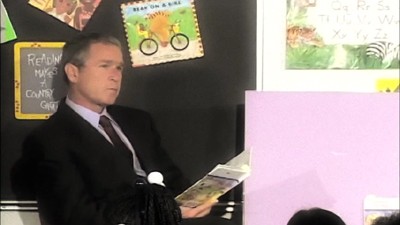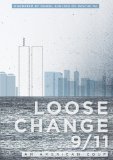| Reviews & Columns |
|
Reviews DVD TV on DVD Blu-ray 4K UHD International DVDs In Theaters Reviews by Studio Video Games Features Collector Series DVDs Easter Egg Database Interviews DVD Talk Radio Feature Articles Columns Anime Talk DVD Savant Horror DVDs The M.O.D. Squad Art House HD Talk Silent DVD
|
DVD Talk Forum |
|
|
| Resources |
|
DVD Price Search Customer Service #'s RCE Info Links |
|
Columns
|
|
|
Loose Change 9/11: An American Coup
Microcinema // Unrated // September 22, 2009
List Price: $17.99 [Buy now and save at Amazon]
 Alright, so last things first: "Loose Change 9/11: An American Coup" - the latest re-edit of the popular conspiracy theory documentary - includes in its wrap-up a monologue about how we can choose to either let our emotions control our thoughts or allow sound logic, facts, and evidence to convince us of the truth. Wise words, considering the film spends the rest of its run time assaulting us with flimsy logic and mangled facts, all while trying to win us over with knee-jerk emotional response.
Alright, so last things first: "Loose Change 9/11: An American Coup" - the latest re-edit of the popular conspiracy theory documentary - includes in its wrap-up a monologue about how we can choose to either let our emotions control our thoughts or allow sound logic, facts, and evidence to convince us of the truth. Wise words, considering the film spends the rest of its run time assaulting us with flimsy logic and mangled facts, all while trying to win us over with knee-jerk emotional response.Of course, by this point, the makers of "Loose Change" are in such a lather over the whole thing that they never quite see the irony in such a statement. Perhaps cooler heads would've noticed they shouldn't be asking for logic over emotion after spending ninety minutes berating the audience with irrationality, to the point of bullying. Several times throughout the film, narrator Daniel Sunjata (reading text by writer/director/editor Dylan Avery) gets downright nasty, assaulting us with words along the lines of "only an idiot could fail to make that connection" and "sure, you could believe the government, if you're a simpleton." (I'm paraphrasing, natch, but that's the gist.)
Never knowing of Occam's Razor, Avery's script laughs at conclusions made about the 9/11 attacks for being too simple. The filmmaker refuses to believe in coincidence, yet the only proof he offers to the contrary is that coincidence is unlikely. Avery lives in a world where nothing is accidental, so if, say, Donald Rumsfeld was scheduled to give a speech on national security the morning of the attacks, it can only mean one thing: the White House was in on the whole damn thing.
I repeat: Avery's best argument that 9/11 was an inside job is that coincidence doesn't exist. And he's snotty about it, Sunjata's narration sneering at the viewer for even bothering to think that hey, it might not be that uncommon for the Secretary of Defense to do things related to national security on a regular basis. (By this logic, the entire CNN crew might as well be in on it, too, because why else would they be reporting the news that early in the morning?)
There are many things said about overlooked reports and previously planned war games and all those other things that had the government on notice over possible terrorist threats, including assault by hijacked airplane. Rather than translate this as the rest of us have, as a regretful, maddening disregard of the warning signs, Avery insists those warnings were clues that the whole thing was engineered by the Bush team. From the film's conclusions, we must then assume that the Bush team was wildly arrogant to reveal their plans months in advance, like a Bond villain giving away his best secrets, right there in front of 007.
The movie brings up Cheney and Rumsfeld's involvement in the conservative think tank Project for the New American Century in the late-90s, although the leaps in logic astound. Yes, the Project provided the world with an early peek at their Iraq War policy, and yes, it's an unfortunate coincidence about the phrasing about "a new Pearl Harbor." But where most critics stop at suggestions of how the Project's work reveals the long-simmering desires of a group of hawks too eager to rush into war, Avery laughably pushes further, demanding that the think tank's papers are bona fide proof that they pulled the attacks off themselves.
Or, at least, they were complicit with them. The movie never really figures that out, and just hopes a bunch of almost-ideas stick in your mind that something's not right. Here, the Bush administration did the deed themselves. There, they knew others were planning it but let it happen. The film itself opens with a jumble of hastily connected concepts that whiz by quickly enough to build an emotional response (a ha!) without pausing to ask us if we think Avery is comparing Bush to Hitler, FDR, LBJ, or the guy on the grassy knoll. As long as he throws out a heap of historical names and the music bellows ominously, we'll pick up on the "something fishy" vibe enough to not trust anybody (except anyone Avery trusts, obviously). Tone is enough for an argument.
And it's just as well, since Avery's arguments have a nasty habit of contradicting themselves. Sometimes it's head-smackingly obvious, like a bit where the film grumbles about how a plane didn't hit the Pentagon because there was no visible rubble - all while we're looking at images of visible airplane rubble at the Pentagon. Elsewhere it's in the seams, like the repeated claims that the government was both too stupid to foil the plot and genius enough to plan it in the first place. Other times you have to wait for it, like the film's on-again, off-again belief of the hijackers' involvement. In some scenes, the narration tells us they were patsies; elsewhere, they're masterminds whom law enforcement overlooked.
Since the hijackers were reportedly seen carousing at strip clubs in the evenings before the attacks, they obviously must be innocent, Avery claims, since the hijackers were devout Muslims, and devout Muslims don't drink alcohol or go to strip clubs. The obvious retort is that anyone planning the murder thousands of innocent people might just be a massive d-bag who gives himself a little extra wiggle room with his beliefs. Oh, and they never properly mastered how to land a plane, which clearly makes them innocent, never mind that they weren't really concerned with the landing part in the first place.
Avery's sloppy editing and ADD-addled bouncing from idea to idea leaves us dizzy, so by the time the movie's finished talking about these nineteen men, we can't remember if Avery thinks they're in on it or not; all we know is that something's wrong somewhere, and it's all Dubya's fault.
I've heard a lot of things said about President Bush over the last decade - I should know, since I said a lot of it myself - but one thing I've never heard before is that the former President is too crafty. Wily. Always two steps ahead of the game. A total criminal genius, in fact, able to coordinate tens of thousands of co-conspirators yet keep every last one of them quiet.
Remember that footage of Bush in the elementary school in Florida, after hearing that the second plane had hit? You know: all that sitting still, doing nothing, with that stare my dog gets when she hears a fart. Defenders chalked it up to Bush playing it cool; detractors chalked it up to incompetence. But what does Dylan Avery think?
What else? Bush sat there reading "My Pet Goat" for seven long minutes because - wait for it! - he knew he was safe! The reason: Bush's itinerary had been made public, so terrorists knew he was in Florida, and obviously the only reason they didn't strike there is because Bush planned the whole thing, the sly devil. All that stuff about Al Qaeda wanting to make symbolic strikes at America by taking down our most recognizable buildings? Forget it. Bush - our own President Blofeld - knew Emma Booker Elementary School was safe because he deemed it so. Brilliant!
So if Bush is the mastermind, what about Osama bin Laden? Clearly, he's innocent, you see, because the day of the attacks, a couple Middle East leaders blamed it on the Jews instead. And that's good enough for Avery. Osama, you're off the hook.
Seriously.
Oh, and Avery has a good laugh at all the "experts" who accused bin Laden, who, the narration says, has obviously been dead for several years, and anyone who can't figure that out is a major rube, case closed. The movie overlooks one small detail: bin Laden's been in the news all year long, with reports focusing rather heavily on the part about him being quite not at all dead. Huh.
Now's a good place to mention that Avery spends much of the movie ridiculing those who jump to conclusions without doing the research - then spends the rest of the movie relying on early, conclusion-jumping reports to back up his claims. Around noon on September 11, some guy on Fox said how he couldn't see any wreckage at the United 93 crash site, and that statement (and others like it, all made in the heat of the moment, conjecture spewed to help make sense of it all) becomes Avery's backing evidence, instead of, you know, actual evidence.
The film's research is very pick-and-choose. Disregarding things like "science," Avery carefully selects anecdotal evidence regarding the Towers' collapse (hey, man, one time, this building burned for a long time and didn't collapse, so obviously no buildings ever, ever, ever could collapse by fire, either). Or he wheels in his own researcher, hired to analyze a paint chip found in the rubble (hey, man, this paint chip, which could've come from anywhere around Ground Zero, show signs of a couple rather common elements, but, like, they're elements that are also used in explosives, so, you know, inside job, man!!!).
This leads to a ramble about Bush's grandfather, who knew somebody who went to high school with a guy whose sister dated a guy who was acquitted of trying to overthrown the FDR government. (Wait, I thought FDR was the bad guy!) None of it makes much sense, especially once the narration up and tells you that all charges were dropped because they were bogus yet we should believe it anyway. No matter. The whole idea is to convince you that maybe, just maybe, the Bushes have been trying to take over the country for decades now, and apparently having two family members serving as the world's most powerful man didn't quite fit that bill.
And when all else fails, Avery reaches for the trump card: rabid paranoia. The final interviewee is a man who escaped the Towers, but only after firefighters had to yell at him to leave. (The film plays this as an obvious clue that the firefighters were planting the detonators; why else would rescue teams want a man to flee a burning building?) The man insists the sounds he heard while inside the WTC were planned explosions (and not, say, signs of a burning skyscraper getting ready to fall down). The whole thing was very suspicious to him, but more troubling is the fact that the man died seven years later. Clearly, he was "terminated" for knowing too much.
This is how the movie ends, with faux bravery about how dangerous it is to discuss such things, and how awesome it is to demand new answers when you refuse to believe the real ones. Conspiracy theorists love this stuff, making them feel like heroes for speaking the unspeakable and knowing the forbidden. Too bad it's all hogwash: the only danger to Avery saying this stuff is that he'll be called a total knob on DVD review websites.
"Loose Change" has been floating around in various forms since 2005. Avery posted his original edit online for viewers to watch for free; he's since updated and reworked bits here and there, resulting in four official versions. (The third version is absurdly titled "Loose Change: 2nd Edition Recut.") For this fourth and (fingers crossed) final version - which adds the "American Coup" subtitle to let us know it means business - Avery brought in actor Daniel Sunjata to re-record the narration, exchanging Avery's lifeless monotone for his own lifeless monotone.
Why all the revisions? Did the filmmaker uncover shocking new truths that had to be told? Nope. It turns out that each edit of the film contained mistruths so easily disproven that Avery had to remove them from his film - all while showing no problem with replacing them with all-new theories. Throughout the various edits, Avery has with utmost certainty insisted that United 93 was shot down and/or landed secretly in Cleveland; that the planes that flew into the Towers were remote-controlled and/or fully manned; that a stash of gold hidden between the WTC was removed and/or not actually gold. Surprisingly, a good deal of footage stolen from the Naudet brothers' documentary "9/11" remains in this fourth edit, despite the Naudets demanding it be removed. (Dylan Avery: copyright rebel!)
Since its initial release, "Loose Change" has produced a cottage industry of "Loose Change" dubunkers. Everyone from bloggers to the Department of State to other 9/11 truthers have taken the film to task, creating detailed articles and websites devoted entirely to nitpicking the movie apart, claim by claim. There's not enough space here to recount all of it; a simple Google search will take you where you want to go.
Of course, don't tell 'em I sent ya. They might come after me next. And then they'll tell me to flee a burning building. The bastards!

Ah, Mr. Bond. I've been expecting you.
The DVD
Microcinema has released "Loose Change 9/11" on a region-free flipper disc, with an NTSC version of the film on one side and a PAL version on the other.
Video & Audio
Compiled mainly from archival footage and new digital video interviews, this updated version of "Loose Change" looks about as mediocre as you'd expect; the best looking stuff here is the occasional clip stolen from modern news broadcasts. Most of the new interviews look hazy and cheap, sometimes with heavy grain. Presented in 1.78:1 anamorphic widescreen.
The stereo soundtrack is passable enough. Mic Cartier's musical score comes through cleanly, while interviews range from clear to slightly muddied. No subtitles are provided.
Extras
In "Exclusive Interview with Daniel Sunjata" (5:34; 1.78:1 anamorphic), the narrator explains how he got involved in the conspiracy movement. You gotta admire the disc's attempts at seriousness here, insisting on labeling Sunjata a "professional actor" captured in a hard-to-get "exclusive" chat!
"Interview with Richard Gage" (10:15; 1.78:1) sits us down with the founder of Architects and Engineers for 9/11 Truth, who repeats several of the film's rambles about the building's collapse. The point of this interview is that there's no way a veteran architect could ever be wrong about things like tall buildings.
"The Art of Janette McKinley" (9:12; 1.78:1) features McKinley (a flaky New York resident who shows up in the movie as a 9/11 witness) trying to explain the sculptures she created as part of her therapy. If you ever thought watching an amateur artist explain her inexplicable abstract work was fun, this will change your mind.
Packaged with the disc is a booklet containing crew biographies, a "fact sheet," and an essay by Sunjata, who complains that nobody takes conspiracy nutters seriously these days.
Final Thoughts
Look: if, for some reason, you're still interested in seeing this stinky pile of nonsense, you can see it for free online any time you like. (You can even pick your version, so you can see which debunked tirades Avery had to remove!) So there's no reason you should be giving the filmmakers one red cent, even if you want to believe them.
But, really, the mood to watch should only strike you if you want to see thin arguments, misleading statements, faulty logic, and flat-out bat-poop crazy. "Loose Change" makes for a fascinating sociology experiment, showcasing just how far some people will go to defend their own problematic beliefs.
And as a film? It's amateurish and rambling and just plain obnoxious, not worth the plastic used to make the disc. Skip It.
|
| Popular Reviews |
| Sponsored Links |
|
|
| Sponsored Links |
|
|
| Release List | Reviews | Shop | Newsletter | Forum | DVD Giveaways | Blu-Ray | Advertise |
|
Copyright 2024 DVDTalk.com All Rights Reserved. Legal Info, Privacy Policy, Terms of Use,
Manage Preferences,
Your Privacy Choices | |||||||















